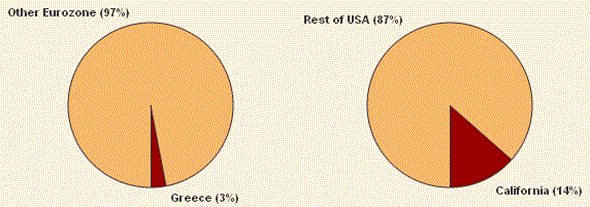Greece and California do share some similarities: Sun and Deficits. Why is Greece such a big problem for the eurozone when the arguably far-worse financial plight of California is not raising similar concerns about the US or the dollar?

The question seems pertinent given the relative insignificance of the Greek economy – it accounts for less than 3 per cent of eurozone GDP (California provides about 13.5 per cent of US GDP). Could it be that the California is treated differently because the US allows fiscal transfers between states, to help the weakest, while the eurozone might just let Greece fall into an abyss, whatever the consequences? In effect the Financial Times notices that Not only California is in deep trouble. While the Greek fiscal deficit is "only" 13.8%, some US states can easily beat that number…

1) How can we explain why financial markets go wild about Greece, but seem uninterested in the probability of a Californian default? Hint
2) What kind of adjustment can you predict for Greece, which is on a fixed exchange rate with the rest of its major trading partners in the the eurozone
